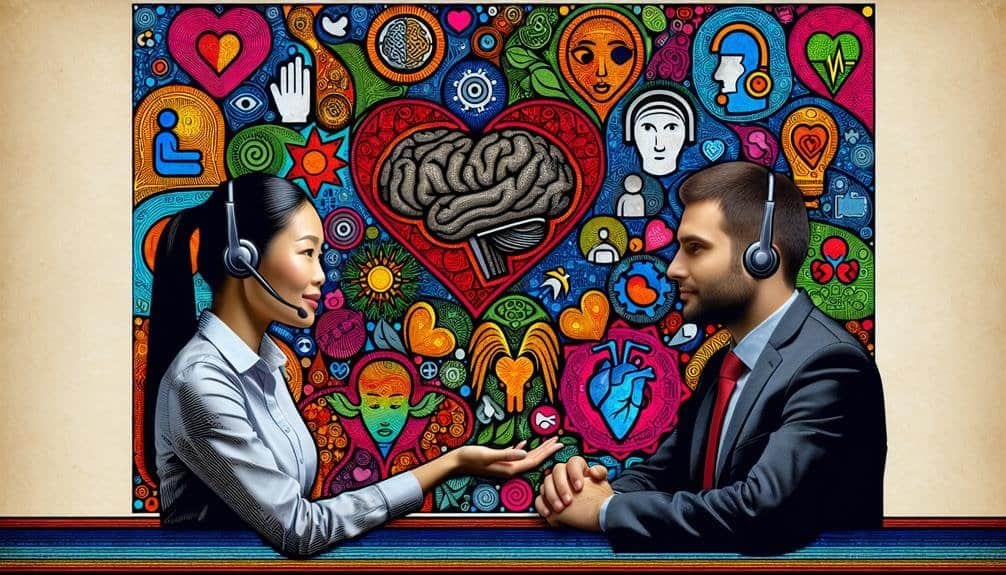Harnessing the Power of Emotional Intelligence in Marketing
In today's increasingly competitive marketplace, the ability to connect with consumers on an emotional level has become a crucial aspect of successful marketing strategies.
Harnessing the power of emotional intelligence in marketing involves understanding and leveraging the complex interplay of emotions in consumer decision-making.
From identifying emotional triggers to crafting brand messaging that resonates deeply with the target audience, the potential applications of emotional intelligence in marketing are vast.
This emerging trend not only holds the promise of creating more impactful and memorable brand experiences but also has the potential to cultivate long-term customer loyalty.
As we delve into the intricacies of emotional intelligence in marketing, it becomes evident that its effective application can significantly influence consumer behaviors and perceptions.
Key Takeaways
- Emotional intelligence in marketing involves understanding and leveraging emotions in consumer decision-making.
- Emotional branding creates a strong bond between the brand and the consumer by resonating with their emotions, values, and aspirations.
- Identifying emotional triggers is crucial for understanding and influencing consumer behavior, as they drive purchasing decisions.
- Crafting emotionally resonant brand messaging based on consumer psychology helps create a sense of connection and loyalty, leading to brand affinity and customer engagement.
Understanding Emotional Intelligence in Marketing
Understanding emotional intelligence in marketing requires a deep understanding of consumer behavior and the ability to empathize with their needs and desires. Emotional branding and customer empathy are crucial components of this understanding.
Emotional branding involves creating and nurturing an emotional connection between the brand and the consumer. This connection is built on the ability of the brand to understand and resonate with the emotions, values, and aspirations of its target audience. By employing emotional branding, marketers can create a strong and enduring bond with consumers, leading to brand loyalty and advocacy.
Furthermore, customer empathy plays a pivotal role in emotional intelligence within the marketing domain. It involves stepping into the shoes of the consumers, comprehending their perspectives, and acknowledging their emotional states. By doing so, marketers can tailor their strategies to address the genuine needs and concerns of their target audience, thereby fostering a deeper connection.
This connection, rooted in empathy, can significantly impact consumer decision-making and brand perception. Ultimately, understanding emotional intelligence in marketing entails leveraging emotional branding and customer empathy to establish meaningful and enduring relationships with consumers.
Identifying Consumer Emotional Triggers
Building on the foundation of emotional branding and customer empathy, identifying consumer emotional triggers is a crucial aspect of understanding and influencing consumer behavior in marketing. By recognizing and understanding the emotional triggers that prompt consumer actions, marketers can tailor their strategies to create more impactful and resonant campaigns. Identifying consumer emotional triggers involves delving into the psychological and emotional factors that drive consumer behavior, allowing marketers to craft messages that deeply resonate with their target audience. This process enables marketers to tap into the core emotions that drive purchasing decisions and brand loyalty.
| Emotional Trigger | Example |
|---|---|
| Fear | Insurance companies highlighting the consequences of being uninsured |
| Excitement | Product launches with limited edition items to create a sense of urgency |
| Trust | Testimonials and reviews from satisfied customers |
| Belonging | Community-focused campaigns that emphasize inclusivity |
Crafting Emotionally Resonant Brand Messaging
Crafting emotionally resonant brand messaging requires a deep understanding of consumer emotions and a strategic approach to connecting with their core values and aspirations. Emotional branding is founded on the principle that consumers make purchasing decisions based on their emotions rather than solely on product features or rational benefits.
To craft emotionally resonant brand messaging, marketers must delve into consumer psychology to comprehend the underlying factors that drive purchasing behaviors. This involves identifying the emotional triggers that resonate with the target audience and leveraging them to create compelling brand messages.
Consumer psychology provides valuable insights into the emotions, desires, and aspirations that influence purchasing decisions. By tapping into these emotional drivers, marketers can create brand messaging that resonates deeply with consumers, fostering a sense of connection and loyalty.
Effective emotionally resonant brand messaging aligns with consumers' values, beliefs, and aspirations, evoking positive emotional responses that strengthen brand affinity and drive customer engagement. By strategically infusing brand messaging with emotional appeal, marketers can establish a powerful and enduring connection with their target audience, ultimately leading to increased brand loyalty and advocacy.
Leveraging Emotional Intelligence in Content Creation
As marketers, leveraging emotional intelligence in content creation is vital for establishing a genuine connection with the audience.
Crafting emotionally resonant brand messaging involves tapping into the emotional content resonance and authentic storytelling that fosters a deep connection with the audience.
Emotional Content Resonance
Leveraging emotional intelligence in content creation involves tapping into the psychological and emotional aspects of the audience to create resonance and connection. This can be achieved through a well-defined emotional content strategy, which aims to evoke specific emotions that align with the brand's values and messaging.
When done effectively, emotional content resonance can have a profound emotional branding impact, fostering a deeper connection and loyalty from the audience. To ensure that emotional content resonates with the audience, consider the following:
- Understanding the target audience's emotional triggers and motivations
- Conducting thorough research to identify the emotions that drive audience engagement
- Crafting content that authentically speaks to the identified emotions, fostering a genuine connection with the audience.
Authentic Storytelling Connection
Successfully connecting with an audience through authentic storytelling requires a deep understanding of emotional intelligence and its application in content creation. Storytelling authenticity is crucial in establishing a genuine connection with the audience. This involves crafting narratives that are sincere, relatable, and resonate with the emotions and experiences of the target audience.
Emotional connection strategies play a pivotal role in authentic storytelling, as they enable marketers to tap into the audience's feelings, values, and beliefs. By incorporating emotional intelligence into content creation, marketers can effectively convey the brand's message in a compelling and authentic manner. This not only fosters a deeper connection with the audience but also cultivates trust and loyalty.
Ultimately, leveraging emotional intelligence in authentic storytelling empowers marketers to create content that truly resonates with their target audience.
Audience Empathy Engagement
Crafting content that demonstrates empathy and engages with the audience's emotions is a pivotal application of emotional intelligence in marketing. This approach involves understanding the audience's needs, desires, and pain points, and then creating content that resonates with them on an emotional level.
To effectively engage with the audience's emotions, marketers can leverage emotional branding, which involves creating content that evokes specific emotions and connects with the audience on a deeper level.
Additionally, fostering customer empathy is crucial in understanding the audience's perspective, experiences, and feelings, allowing marketers to tailor content that genuinely resonates with them.
Utilizing Emotional Intelligence in Customer Service
In customer service, emotional intelligence plays a vital role in fostering positive interactions. By empathizing with customers, businesses can gain a deeper understanding of their emotions and concerns, allowing for more effective issue resolution.
Utilizing emotional intelligence in customer service enables companies to create a supportive and empathetic environment, ultimately enhancing the overall customer experience.
Empathy in Interactions
Empathy is a crucial component of utilizing emotional intelligence in customer service. It allows for genuine connections and understanding between businesses and their customers.
When empathy in leadership is fostered, it sets the tone for the entire organization to prioritize understanding and compassion in their interactions with customers.
This can be achieved through emotional communication strategies that emphasize active listening, acknowledging the customer's feelings, and responding with genuine care and concern.
By prioritizing empathy in interactions, businesses can create a customer-centric environment where individuals feel valued and understood. This ultimately leads to stronger relationships and brand loyalty.
Additionally, empathetic interactions can also lead to valuable insights into customer needs and preferences. This enables businesses to tailor their products and services more effectively.
Understanding Customer Emotions
When striving to cultivate an emotionally intelligent approach to customer service, understanding and responding to customer emotions becomes paramount for fostering meaningful connections and driving brand loyalty.
Customer empathy is the cornerstone of this understanding, as it involves actively listening to and comprehending the feelings and perspectives of customers.
By demonstrating empathy, businesses can establish an emotional connection with their customers, leading to heightened trust and loyalty. This emotional connection goes beyond simply addressing the functional aspects of a product or service; it taps into the deeper, more personal aspects of customer experience.
Understanding customer emotions enables businesses to tailor their interactions and offerings to better meet the emotional needs of their customers, ultimately creating a more profound and lasting impact.
Resolving Issues Empathetically
Utilizing emotional intelligence in customer service involves approaching and resolving issues with a deep understanding of the customer's emotions and perspectives.
When it comes to empathetic problem solving, it's essential to:
- Listen actively to the customer's concerns and feedback. This demonstrates empathy and shows that their feelings are being acknowledged.
- It allows for a deeper understanding of the root of the issue, leading to more effective problem resolution.
Measuring Emotional Impact in Marketing Campaigns
To gauge the emotional impact of marketing campaigns, it is crucial to employ reliable and valid measurement tools that capture the nuanced responses of consumers. Measuring emotional response and conducting emotional impact analysis allows marketers to understand how their campaigns are resonating with their target audience. One effective way to measure emotional impact is through the use of tools such as surveys, interviews, and focus groups. These methods provide valuable qualitative data that can reveal the emotional connections consumers have with a brand or a specific marketing campaign.
| Measurement Tools | Description | Benefits |
|---|---|---|
| Surveys | Surveys can be designed to gather specific emotional feedback from consumers regarding their responses to marketing campaigns. | Provides quantitative data on emotional impact, allows for easy comparison of results. |
| Interviews | In-depth interviews allow marketers to delve deeper into the emotional responses of consumers, providing rich qualitative data. | Offers detailed insights into consumer emotions, helps in understanding the underlying reasons for emotional responses. |
| Focus Groups | Focus groups facilitate discussion among participants, uncovering shared emotional experiences and perceptions of marketing campaigns. | Allows for observation of group dynamics and interactions, provides diverse perspectives on emotional impact. |
These measurement tools not only help in understanding the emotional impact of marketing campaigns but also aid in making informed decisions to optimize future strategies for maximum emotional resonance.
Cultivating Emotional Loyalty With Consumers
Cultivating emotional loyalty with consumers requires a deep understanding of their values and aspirations, as well as a genuine commitment to building meaningful connections beyond transactional interactions. Building emotional connections is pivotal in creating a lasting bond with consumers, fostering trust, and ultimately, driving customer loyalty.
To achieve this, marketers must employ emotional branding strategies that resonate with their target audience on a deeper level. This involves crafting brand narratives that align with consumers' emotions, values, and beliefs, thereby creating an authentic and relatable brand persona. Additionally, it necessitates consistent and empathetic communication that demonstrates a genuine understanding of consumers' needs and desires.
Key Strategies for Cultivating Emotional Loyalty:
- Implement personalized marketing efforts that make consumers feel seen and understood.
- Leverage storytelling to evoke emotional responses and forge connections with consumers on a human level.
The Future of Emotional Intelligence in Marketing
The evolution of emotional intelligence in marketing is poised to revolutionize consumer engagement and brand loyalty in the coming years. As technology continues to advance, marketers are increasingly focusing on emotional intelligence strategies to create more meaningful and authentic connections with their target audience. This shift towards marketing emotional connections is driven by the understanding that consumers are seeking brands that resonate with their values and emotions.
| Emotional Intelligence Strategies | Marketing Emotional Connections | Impact |
|---|---|---|
| Utilizing personalized messaging | Creating a sense of belonging | Fosters brand loyalty |
| Leveraging social media for emotional storytelling | Eliciting positive emotions | Drives engagement |
| Implementing AI to analyze consumer emotions | Tailoring products to emotional needs | Enhances customer satisfaction |
| Incorporating empathy in customer service | Building trust and rapport | Improves brand perception |
| Measuring emotional engagement metrics | Adapting strategies for emotional resonance | Guides marketing effectiveness |
Conclusion
In conclusion, the integration of emotional intelligence in marketing is essential for creating impactful and resonant brand messaging. By understanding and leveraging consumer emotional triggers, crafting emotionally resonant content, and cultivating emotional loyalty, marketers can build deeper connections with their audience.
As the marketing landscape continues to evolve, the future of emotional intelligence in marketing holds great potential for creating meaningful and lasting relationships with consumers. Embracing emotional intelligence is crucial for success in the ever-changing marketing industry.







